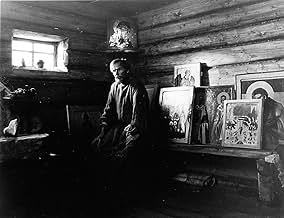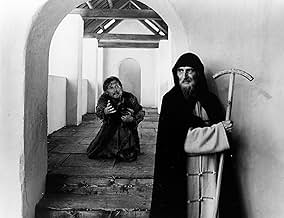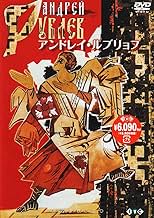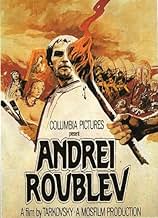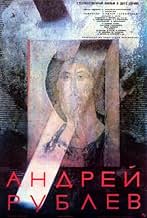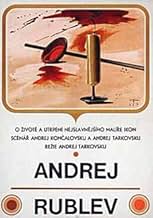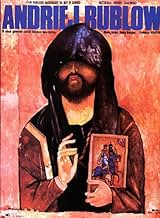The life, times and afflictions of the fifteenth-century Russian iconographer St. Andrei Rublev.The life, times and afflictions of the fifteenth-century Russian iconographer St. Andrei Rublev.The life, times and afflictions of the fifteenth-century Russian iconographer St. Andrei Rublev.
- Director
- Writers
- Stars
- Awards
- 4 wins & 1 nomination total
- Durochka
- (as Irma Raush)
- Patrikey, monakh
- (as Yu. Nikulin)
- Skomorokh
- (as R. Bykov)
- Stepan, sotnik Velikogo knyazya
- (as N. Grabbe)
- Foma, monakh
- (as M. Kononov)
- Starshiy liteyshchik
- (as S. Krylov)
- Tatarskiy khan
- (as B. Beyshenaliev)
- Aleksey, monakh
- (as A. Obukhov)
- Sergey
- (as Volodya Titov)
- Efim
- (as N. Glazkov)
- Director
- Writers
- All cast & crew
- Production, box office & more at IMDbPro
Featured reviews
Fortunately for us, this movie, recently rereleased in a DVD transferred from a pristine 35mm print, may now be viewed intact, and it is one of the great triumphs of mankind's stay on the planet. It is a masterpiece almost without flaw. The beautiful painterly images follow one another in breathtaking succession. At least three of the eight chapters, if taken individually, could stand alone as separate masterpieces.
The ostensible subject is the life of Andrei Rublev, a 15th century monk who is renowned as Russia's greatest creator of religious icons and frescoes. Rublev himself, however, is merely a useful device. Little is known about him, and most of the episodes in the movie come straight from Tarkovsky's imagination of what might have been. Sometimes one must ignore the facts to get to the truth.
The movie is not about one talented monk, but about Russia, and Rublev stands in as a useful symbol since he lived in a time when he could personally witness two of the key elements in the development of Russia's unique culture: the growing force of Byzantine Christianity, and the Mongol-Tatar invasions. In addition he was an artist and a thinker, and experienced first-hand the difficulty of following those paths in Russia. Rublev's own inner conflicts allow the filmmaker to illuminate thoughts on the pagan and the sacred, the nature of art, the relationship of the artist to the state, what it means to be Russian, and what it means to be human.
It is beautiful, mystical, and profound, but the truly inspiring aesthetics are matched with complete technical wizardry. I simply don't know how some of the shots were created. One I do understand, and stand in awe of, is a continuous single camera shot, just before the church door is breached by Tatar invaders, which involves action in several different locations at multiple elevations as well as the correct timing of hundreds of extras and horses. It makes the first scene of Touch of Evil look like a high school film project.
It is a difficult movie to follow. One might liken it to James Joyce's Finnegan's Wake as a work of genius so monumental and complex, and so disdainful of traditional narrative form, that it requires extensive thought and study to understand it. And even after studying it, watching it repeatedly, and reading Tarkovsky's own comments about it, one still finds it opaque in many ways.
Tarkovsky was free to create the work of art he wanted, without concern for profit. The original 205 minute cut was also free from outside censorship. He used this freedom to realize his personal artistic vision. There is no other movie like it, and there may never be. Score it 11 out of 10.
Andrei Rublev was a medieval Russian iconographer; the film chronicles his struggle to maintain faith and artistry in a world of immeasurable cruelty and suffering. Rather than give us a crackerjack plot line with all the proper scene climaxes & paradigm shifts, director Tarkovsky presents us with a world in which we must immerse ourselves; once we are inside, we are confronted with rigorous pain and profound triumph. The movie is divided into chapters; the final one, involving an orphaned bell-maker's son, is a stunning film-within-a-film that provides a microcosm of the whole movie. That section, if it stood alone, would be my all-time favourite film.
Be warned: "Andrei Rublev" is SLOW. You have to slide into it; it's not a flick which dazzles, it is a world which beguiles, and which demands to be inhabited. Also, there are EXTREMELY difficult scenes to watch--torture and bloodshed abounds. Watching the Tartar attack on a Russian town is the most painful experience I've ever had--not just in a cinema, but in life.
For those willing to make the gruelling trek, however, "Andrei Rublev" is an inspiring, life-affecting experience. Created under an oppressive Soviet regime (which banned the film for years, recognizing its symbolic commentary on 20th-century Soviet government), the film shows how life can be valuable and even joyful, no matter how much suffering stands in the way.
Especially recommended for Tarkovsky fans, Dostoevsky fans, fans of medieval art, and anyone grappling with questions about suffering and human expression.
A bit difficult to review this movie. It is clearly the work of a master craftsman: the exquisite cinematography, the sheer scale of the subject matter and time period, the themes, the obvious adoration director Andrei Tarkovsky has for his subject.
Yet it is often quite a grind to watch: clocks in at well over 3 hours and moves very slowly. Several scenes will go by without development in plot or theme. Furthermore, the separate time periods don't necessarily form a narrative. They often just feel like things happening, with no connection between them.
While acknowledging that the film is well made, I fail to see how it is so highly regarded. I did not come away feeling that I had just watched a masterpiece, something incredibly profound or moving.
Did you know
- TriviaFilm debut of Anatoliy Solonitsyn, and the first of four movies he made together with director Andrei Tarkovsky before his death from cancer in 1982. Had Solonitsyn lived, he would also have played protagonist Andrei Gorchakov in Tarkovsky's Nostalghia (1983), as well as star in a project titled 'The Witch' which eventually became Tarkovsky's final production, Le Sacrifice (1986).
- GoofsThe smoothly-cut logs that feature many times in the early scenes are clearly cut with machinery not available in the early fifteenth century.
- Quotes
Andrei Rublyov: You just spoke of Jesus. Perhaps he was born and crucified to reconcile God and man. Jesus came from God, so he is all-powerful. And if He died on the cross it was predetermined and His crucifixion and death were God's will. That would have aroused hatred not in those that crucified him but in those that loved him if they had been near him at that moment, because they loved him as a man only. But if He, of His own will, left them, He displayed injustice, or even cruelty. Maybe those who crucified him loved him because they helped in this divine plan.
- Alternate versionsSoviet television created a severely trimmed 101-minute version that the director did not authorize. Notable scenes removed from this version were the raid of the Tatars and the scene showing naked pagans. The epilogue showing details of Andrei Rublev's icons was in black and white as the Soviet Union had not yet fully transitioned to color TV.
- ConnectionsEdited into Ombres vives ...une autre histoire du cinema... (2013)
- How long is Andrei Rublev?Powered by Alexa
Details
- Release date
- Country of origin
- Languages
- Also known as
- Andréi Rublev
- Filming locations
- Production companies
- See more company credits at IMDbPro
Box office
- Budget
- RUR 1,000,000 (estimated)
- Gross US & Canada
- $124,189
- Opening weekend US & Canada
- $11,537
- Sep 15, 2002
- Gross worldwide
- $180,956
- Runtime3 hours 9 minutes
- Color
- Sound mix
- Aspect ratio
- 2.35 : 1


